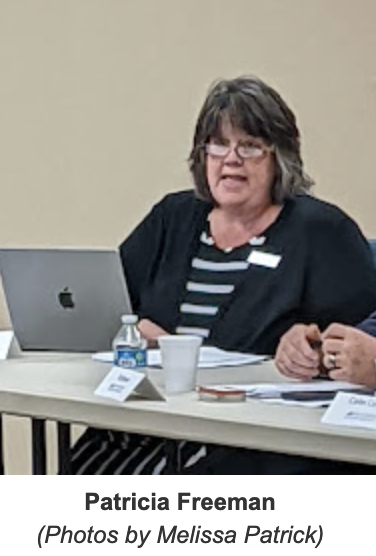Heart expert: Ibogaine to treat opioid addiction is safe only in hospitals; others say risk can be mitigated; ‘rough’ plan outlined

By Melissa Patrick
Kentucky Health News
In a session focused on challenges of getting the psychedelic drug ibogaine approved by the Food and Drug Administration for treating addiction with help of the state’s opioid settlement funds, a cardiologist said it couldn’t be done in a reasonable time and the drug is unsafe.
“My opinion is that ibogaine is not safe, the efficacy is unproven, it’s unlikely to be approved by the FDA in a reasonable time period, and the cost to Kentucky would be unsupportable,” said Dr. Mark Haigney, a board-certified cardiologist and electrophysiologist, and an attending physician at the Walter Reed National Military Medical Center.
Haigney was invited to a special Kentucky Opioid Abatement Advisory Commission meeting on Oct. 17 by commission member Patricia Freeman, a pharmacy professor at the University of Kentucky. The meeting also saw the head of the commission discuss a “rough” plan for funding ibogaine research.
After two hearings that focused on ibogaine development and personal testimonies favoring the drug, she asked to invite experts in regulatory drug development to testify about the challenges of navigating ibogaine through the FDA process, given its potential for damage to the heart and its current classification as a Schedule I drug with no medical use.
Freeman said she had concerns that people at one hearing thought there would be quick access to ibogaine with the $42 million investment and felt compelled to ensure they understand that this would be a multi-year endeavor with no guarantee of success.
“I felt this was important as it would help make sure that at large, our commission would be as fully informed as possible prior to making a decision on proposed ibogaine funding,” Freeman said.
Haigney, who described himself as an “expert in drug-induced sudden death and drug-induced loss of consciousness,” said that while he recognized the attractiveness of a single-dose drug like ibogaine to treat opioid-use disorder, such a drug must be “safe in the immediate term, effective in the long term, FDA-approved, and affordable for the huge number of Kentuckians with opioid-use disorder.”
He said ibogaine isn’t safe because it is known to cause cardiac arrhythmias and sudden death. In detail, he explained that this happens because ibogaine causes a “prolonged QT interval,” which is one of the measurements taken by a standard electrocardiogram.
A prolonged QT interval occurs when the heart muscle takes longer to contract and relax than usual, which can affect heart rhythms and lead to sudden cardiac arrest.
Haigney said the FDA requires all drugs to undergo cardiac testing and that “the finding of QT interval prolongation is the most common reason for removal of a drug from further development.”
He added that a prolonged QT interval can happen when a drug blocks the cardiac potassium channels to the heart and that ibogaine is a “potent blocker” of this channel, even with normal therapeutic doses.
“So this means that most if not all subjects would experience some significant degree of blocking the channel,” he said. “And this is a very poor prognostic finding for a drug.”
Haigney pointed to a study of 14 hospitalized patients who received a “relatively low dose” of ibogaine. The average increase in QT interval was 95 milliseconds. He said the FDA’s published guidelines say it is concerned when a drug prolongs the QT interval by 5 milliseconds or more.
“I’ve never seen a drug prolong the QT interval so profoundly,” he said, adding later, “This degree of QT prolongation would be expected, associated with increased risk of fatal events.”
He then asked rhetorically, “Can this drug be given safely?” His answer, “Yes, in the hospital. We do a lot of dangerous things in the hospital with a lot of technology,” adding that this would be “an incredibly resource-demanding” drug to administer.
“The likelihood that this drug with this safety profile will be approved by the FDA in less than 10 years, in my opinion, is remote and the effort will require at least a billion dollars,” Haigney said. “The administration of ibogaine would strain hospital resources at a time when bed shortages are severe. This is a treatment for wealthy individuals who can pay for hospitalization with intensive monitoring,” so it would not help most Kentuckians “who struggle with opioid dependence.”
 Hubbard was asked after the meeting if any speaker had caused him to change his mind about his ibogaine plan. He said, “Dr. Haigney was brought in here to oppose this initiative and he articulated all of the talking points that the opponents of this initiative have already parlayed at public remarks. So there was nothing that was either surprising, nor persuasive about his remarks, and insofar as what he has articulated, are already widely publicly disseminated talking points of opposition.”
Hubbard was asked after the meeting if any speaker had caused him to change his mind about his ibogaine plan. He said, “Dr. Haigney was brought in here to oppose this initiative and he articulated all of the talking points that the opponents of this initiative have already parlayed at public remarks. So there was nothing that was either surprising, nor persuasive about his remarks, and insofar as what he has articulated, are already widely publicly disseminated talking points of opposition.”- “Viable research proposals from qualified research entities” that will match the state’s $42 million
- The state would have ownership of any patentable intellectual property that is generated
- Clinical trials would be held in the West End of Louisville and in Wast Kentucky, “in a way that ensures social, racial, and economic equity of access to the treatment,”
- An approved drug-investigation application from the FDA “with secured clinical-trial sites and a diverse group of qualified clinical-trial participants before the first dollar is ever matched by the commission,”